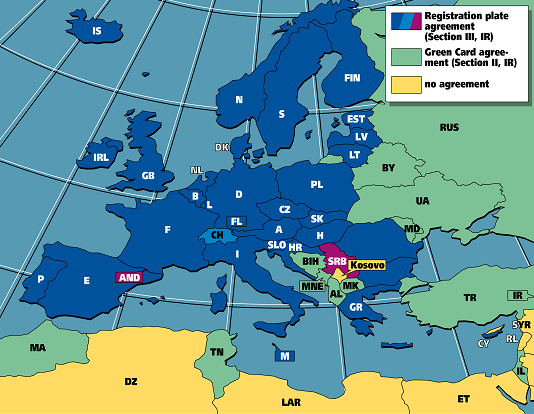The lack of green card damages diaspora’s pocket
The case of a diaspora member damaged financially from a car accident in Kosovo.
During the vacation months, a large number of diaspora members return to their homeland, and many of them do this by car, usually expensive cars. Due to the huge flow of cars in the traffic, it often happens that they get involved in car accidents and then do not get fully compensated for the damage. Koha.net portal had reported Enver Bajra’s case, who lives in Switzerland and had a car accident in Kosovo, and his Casco insurance from Switzerland and the one paid in the Kosovo border did not cover his loss, even though it was not his fault. Thus, this diaspora member lost more than 12,000 Swiss francs from his car’s value. Unfortunately, there are other cases like his as well. All this is a consequence of Kosovo not being part of the Green Card.
What is the Green Card?
The Green Card is an international certificate for motoric insurance, that ensures the driver in case of an accident in another country from the one s/he has insurance, to enjoy full rights and so not be impaired. As such, it is acceptable without any obstacle or extra fee from the authorities of all countries where the Green Card is valid. This card is not yet valid in Kosovo. This is because Kosovo Insurance Bureau (KIB) is not yet a member of the Council of Bureau (COB). There were promises more than five years ago made by the previous governments that the green card issue will be resolved. However, taken into account the efforts being made, there is no concrete result as of now.
The amount paid is much bigger than the damages caused
Kosovo’s diaspora members pay huge amounts of money for insurance policies every time they come to their homeland by their cars, regardless of their insurance covering damages in Kosovo or not. One-month car insurance for diaspora members to be paid at the border costs 20 Euros, while a two-week one costs 15 euro (KIB). According to the Central Bank of Kosovo data, from 2002 until November 2016, insurance companies in Kosovo have collected about 148 million Euros from border insurance fees, mainly from the diaspora members. However, the amount of losses is manifold more lower, only 12.56 millions Euros were paid by the insurance companies to cover losses. Another highly disappointing fact is that the diaspora members have to pay this fee, whereas citizens of Serbia entering Kosovo are freed from that.
How does Diaspora see this tax?
For the diaspora members this is seen as a robbery that is done by home institutions, according to the media reports. This amount of money goes to insurance companies, or as diaspora members express themselves, to a group of individuals with ties to politics. Additional to this fee, it often happens that when an accident occurs, diaspora members have difficulties with their insurances, and their damages are not fully covered. While the amount of money collected in the border is reported to be hundreds of millions, there is no statistics for the real losses caused to them in cases of accidents that we are aware of, but it has to be more than what KIB covers. We should also take into consideration the higher number of accidents that occur during the summer months in Kosovo because of the traffic jam.
The issue with the green card needs to be solved soon
We are well aware of the great contribution that diaspora has given to Kosovo before the war, during the state consolidation process and now in the development process. This important factor should not be “robbed”, but rather welcomed with the highest respect. Let us not forget that the money coming from the diaspora through remittances is almost twice higher than the foreign direct investments. Thus, more facilities should be created for Diaspora for them to come and spend their money as they please, with their family members, in starting businesses, and not be misused – to only have a group of individuals-companies benefiting from them.
Some quick potential solutions.
KIB as the institution with the (highest) direct responsibility for the green card issue must use every possible mechanism to make KIB a member of the Council of Bureau. Due to the lack of green card agreement, KIB has signed bilateral agreements with Macedonia, Serbia and Albania, but these are very limited and thus don’t help diaspora much. If being a member of COB is not possible at the moment, as a short-term solution signing other bilateral agreements with countries where the largest number of diaspora comes from. Priority should be given to states that have the largest number of Kosovo diaspora – Germany, Switzerland, and so on. Another option could be decreasing the price of the fee in the border, taking into consideration that for 14 years, diaspora members have paid about 12 times more than they were reimbursed for their damages.
Every month/year that passes without a concrete solution damages diaspora’s pocket – their families’ pocket in Kosovo, and other potential initiatives they could undertake. All these, very important to Kosovo and its economic development.
Nehat Dobratiqi has completed Bachelor studies in Faculty of Economy of the University of Prishtina, while the Masters studies in Economics in the University of Maine in the United States as part of the USAID scholarship program for Transformational Leadership (TLP). Dobratiqi is currently engaged in Germin in the capacity of researcher focusing in socio-economic policies. This article is a contribution for the TLP Citizens Corps project. The views and opinions in this article are from the author, and not necessarily represent the official policies and views of TLP Citizens Corps. Also, the hypothesis made in this analysis do not reflect the view of any government institution.
